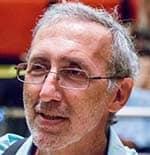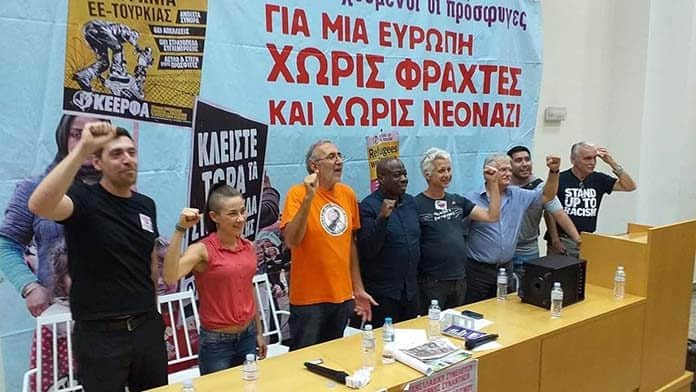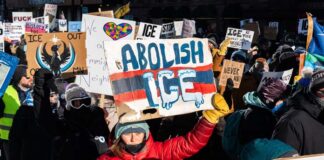Golden Dawn, a violent neo-Nazi party in Greece, grew rapidly following the economic collapse after 2009. But now, according to Petros Constantinou, a key figure in the anti-racist and anti-fascist movement KEERFA, “the rise of Golden Dawn is over.”
The party was a major threat. “They managed in 2012 to enter the Greek parliament with 7 per cent, or half a million votes, and 21 MPs. This was a shock for the left who had underestimated them”, Petros explains.
But in elections this year “they didn’t even get 3 per cent” and lost all their seats in parliament. “A lot of their offices are closed. They had 72 offices and now they have five. There have been big splits. They even lost the number two of Golden Dawn, who left the party.”
With the far right on the rise globally, encouraged by racist populist leaders like Donald Trump, Boris Johnson and Jair Bolsonaro, the success of the Greek anti-racist movement shows how to stop them.
Petros explained that the mainstream parties created the conditions for them to grow, “The [right-wing New Democracy] government responded to the economic crisis with an attack against migrants, opening the space for the fascists.”

“First LAOS, a populist far right party tried to build citizen groups against refugees in the neighbourhoods. These became gangs attacking the refugees. Golden Dawn were tiny in that period. But we argued that this was an environment where they could become more dangerous.
“We started building an [anti-racist] movement by opposing their attacks. It was a campaign with two parallel issues: fighting fascism and solidarity with refugees. The fascists were arguing there are a lot of unemployed and we don’t have the resources in hospitals and schools to take refugees, saying ‘Greek people first’.
“They tried to build stormtrooper groups by opening offices around Greece and using them as points to organise and control areas in the neighborhood. In 2012 to 2013, with the support of the police, they organised a lot of racist attacks, and attacks on political targets. They were trying to eject migrants who were selling in the market and checking how many children of refugees there were in the kindergartens.”
“This led to a huge response from the anti-fascist movement. Whenever even one refugee was attacked, we organised mass mobilisations with support from local authorities, trade unions, communities and the left, to get them out of the streets and also defend the migrants against police, who were always there to arrest them. In 2013 around 100,000 people mobilised locally city by city. There were Saturdays when there were seven demonstrations at the same time.
“Finally, in September 2013 they murdered [anti-racist rapper] Pavlos Fyssas, in the same area where they attacked trade unionists from the Communist Party.
“We managed to turn terror into a powerful movement. The same day he was murdered, 20,000 demonstrated. We campaigned for the trade unions to have a general strike against the fascists. They had already called a general strike around austerity. They decided to hold a concert. We didn’t really agree with the concert, but we organised a demo of 60,000 that marched on the headquarters of the Nazis.
“This put pressure on the government to act. Two days after the demonstration we woke up to see all 19 Golden Dawn MPs in handcuffs. The trial of Golden Dawn has lasted four years.
Golden Dawn on trial
Afrodite Fragkou has covered the trial for socialist newspaper Workers Solidarity. She explained that, “the trial has contributed hugely to Golden Dawn’s implosion. Tons of information has been made public and reached huge audiences. It therefore started to be common sense that they are a Nazi criminal organisation whose only purpose is to create violence that targets everyone who is not with them.

“This isolated Golden Dawn and the result was that they started having conflicts among themselves. They want to give one another up to save themselves.
“Because of that isolation they couldn’t campaign for the elections this year. The anti-fascist movement managed to prevent them campaigning in the streets like other parties. They were blocked from the national television because the workers there had a strike every time Golden Dawn leader Michaloliakos was about to appear.
“They didn’t get re-elected to parliament. So they don’t have money anymore to support offices, which is where they hid their weapons and organised their attacks. The offices started closing down one after another.”
“The anti-fascist movement played a crucial role in the trial, gathering evidence and possible cases. The [right-wing] New Democracy government did start the prosecution but they didn’t seem eager to start a trial so that also took a lot of demonstrations and other actions.”
The trial is expected to finish at the end of October.
But the fight against racism and the far right are not over. The newly elected New Democracy government has launched new attacks on refugees and the right of asylum, and another far right party, Greek Solution, has taken seats in parliament. There have been big disturbances in the chronically overcrowded refugee camps on Lesbos and Samos islands in the Aegean sea.
On 12 October, KEERFA held its annual conference in Athens. Over 700 attended, including close to 100 refugees from camps around Athens, to discuss the way forward for the movement. It marked ten years since the campaign was established—and pledged to continue the fight against racism in the period ahead.
By Mark Goudkamp, participant in KEERFA conference in Athens






